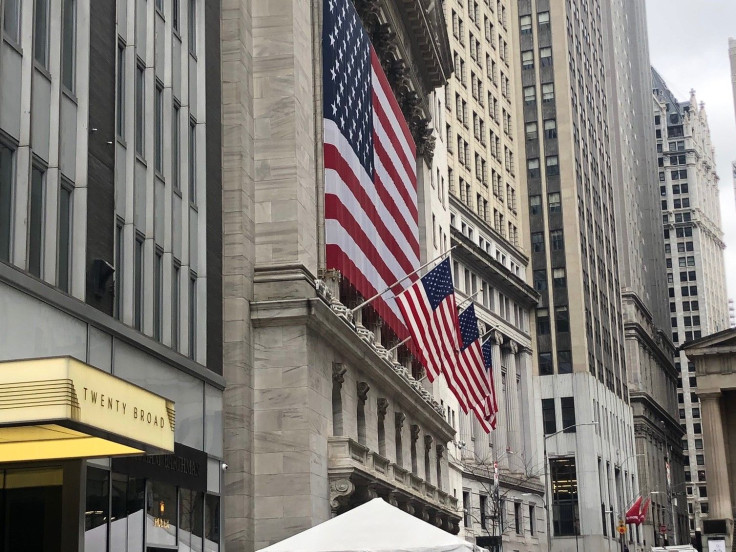Friday’s Stock Market Close: US Equities Rise On New Hopes For Covid-19 Vaccines

KEY POINTS
- Gilead Sciences said its coronavirus drug remdesivir showed good clinical results
- BioNTech said its own coronavirus vaccine may be ready for approval by December
- Producer price index dropped 0.2% in June after recovering 0.4% in May
U.S. stocks climbed on Friday on some positive covid-19 vaccine developments, raising hopes that the pandemic may be limited.
The Dow Jones Industrial Average gained 369.21 points to 26,075.30, while the S&P 500 rose 32.99 points to 3,185.04 and the Nasdaq Composite Index climbed 69.69 points to 10,617.44.
For the week, the Dow gained 0.96%.
Friday’s volume on the New York Stock Exchange totaled 3.92 billion shares with 2,281 issues advancing, 74 setting new highs, and 720 declining, with eight stocks setting new lows .
Active movers were led by (NIO), WiMi Hologram Cloud Inc. (WIMI) and American Airlines (AAL).
Gilead Sciences (GILD) said its coronavirus vaccine candidate, remdesivir, “was associated with an improvement in clinical recovery and a 62% reduction in the risk of mortality compared with standard of care."
The CEO of BioNTech (BNTX) also told The Wall Street Journal the company’s own coronavirus vaccine may be ready for approval by December.
President Donald Trump said that the U.S. relationship with China has been “severely damaged” by the coronavirus pandemic and that he is not focusing on the next stage of any trade deal with China.
The Labor Department said on Friday that its producer price index dropped 0.2% in June after recovering 0.4% in May. For the 12-month period through June, the PPI fell 0.8%.
“On days in which there’s promise of health solution, or that the economy might actually recover faster than expected, you tend to get all your cyclical stocks ... leading the charge,” said Michael Arone, chief investment strategist for State Street Global Advisors. “[But] when it looks like the economy is going to stall, or the recovery will be slower than expected, investors tend to go back to the old growth stalwarts of technology.”
Democratic presidential nominee Joe Biden called for an end to the “era of shareholder capitalism.”
Coronavirus-related hospitalizations spiked to a record in Florida, while California and Texas witnessed rising cases and more deaths.
“For the U.S., the outlook is bleak – the COVID crisis continues to metastasize as transmissions stay elevated while hospitalizations and fatalities rise too,” said Adam Crisafulli of Vital Knowledge. “While U.S. bulls hang on to ‘Amazon, a vaccine, and the Fed’ and those three items will prevent a steep decline, it’s very hard to look at the [S&P 500] and find it near-term compelling.”
“We’re going to see intermittent periods of shutdowns over the next year or so while we’re still grappling with this virus,” said Erin Browne, a multi-asset portfolio manager at Pacific Investment Management Co.. “But I wouldn’t expect we’re likely to see a wholesale shutdown of the U.S. economy like we saw earlier this year.”
“The path forward for the economy will likely hinge on the amount of financial scarring that occurs in the months ahead and degree of consumer engagement as coronavirus concerns fluctuate,” wrote Bruce Bittles, chief investment strategist at Baird. “High levels of initial jobless claims and evidence that small businesses are closing are sobering reminders of the economic challenges that lie ahead.”
Overnight in Asia markets finished lower, as China’s Shanghai Composite index tumbled 1.95%; Japan’s Nikkei-225 fell 1.06%; and Hong Kong’s Hang Seng exchange dropped 1.84%.
In Europe markets finished higher, as Britain’s FTSE-100 gained 0.76%, while France’s CAC-40 climbed 1.01% and Germany’s DAX rose 1.15%.
Crude oil futures rose 2.22% at $40.50 per barrel, Brent crude edged down 0.16% at $43.17. Gold futures slipped 0.08%.
The yield on the 10-year Treasury jumped 4.63% to 0.633% while yield on the 30-year Treasury gained 1.38% to 1.326%.
© Copyright IBTimes 2025. All rights reserved.





















